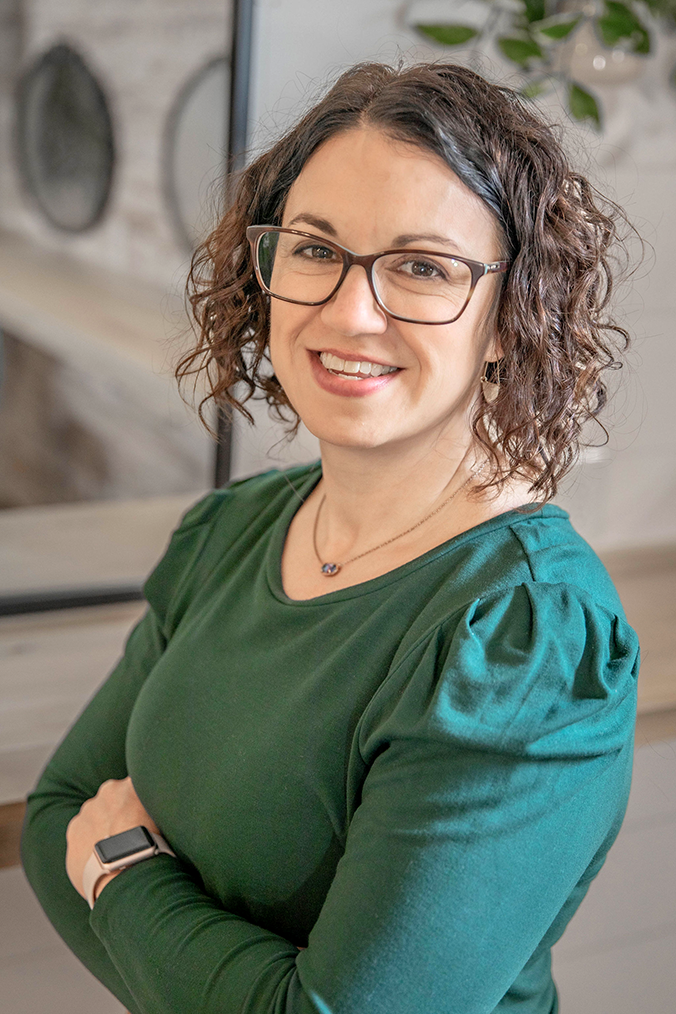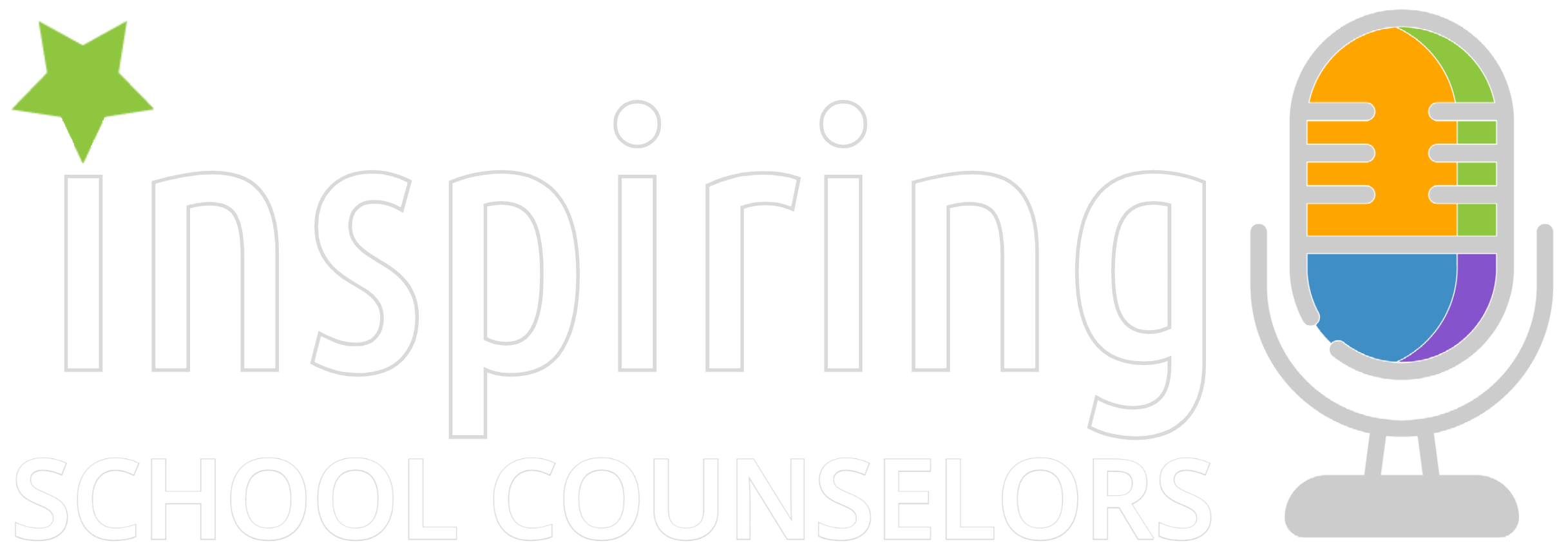When you have worked as a teacher, coach, and administrator for almost 20 years you learn what works and what doesn’t. This week, our guest Alisa Kaczorowski shares the practical tips she has learned about what works with trauma-informed care.

About Alisa Kaczorowski
Alisa Kaczorowski has spent almost two decades in education as a teacher, instructional coach, and school administrator. She is passionate about coaching educators and school leaders to improve curriculum and instruction, as well as school culture, so that students can thrive in safe, productive learning environments. Alisa is a Certified Trauma & Resilience Practitioner and has trained thousands of teachers across the United States. She lives in Indianapolis with her husband, three children, and goldendoodle Hoosier.

Resources
We Want to Hear from You!

What’s your best advice for other school counselors? Who has influenced you? What books do you recommend? We want to know! Please take a few minutes to complete the Inspiring School Counselors form.
Subscribe
Inspiring School Counselors is available on these podcast apps and others. If you can’t find the podcast on your favorite app, let us know and we’ll make sure we get there. If you prefer to listen in your browser, visit https://inspiresuccess.org/podcast every week for a new episode. For new episode notifications and more, follow Inspire Success on Facebook, Instagram, or Twitter.
Transcript
A rough transcript follows.
Matt Fleck:
Hi, everyone. Welcome to the Inspiring School Counselors podcast. I’m Matt Fleck, along with my colleague Aimee Portteus, who talks this week with Alisa Koczorowski. Alisa is a 20-year educator who has done about everything in schools, serving as a teacher, reading specialist, instructional coach, even school administrator during Covid. Alisa started her own business called AK Educational Consulting centered around her passion for sharing what works when it comes to trauma-informed care.
Alisa Koczorowski:
It’s something that we don’t teach a lot of teachers about, and it’s so important. And I saw the difference that it was making in our students and in their families, and in my teachers, that I just felt really strongly that this is something that more schools need to be aware of. And then I was sort of helped along by C because I actually started my business right before covid, if anything good did come of the crazy last few years that we’ve had. It’s that schools that maybe weren’t so aware of the social emotional side of students and the importance of teaching that in schools kind of figured out pretty quickly. Um, during and, and after Covid, if we can say after that, that was really important because suddenly every student, no matter who they were or what their home situation was, was struggling with our, our new reality. So, I almost hate using the term trauma-informed care because I think a lot of people think it’s only for certain students. Right. Um, but really it’s not, it’s just best practice for any kid.
Aimee Portteus:
Right. Well, I, I will be honest with you, I stalked your website just a little bit. Um, and it said, – I love how you had it worded – that you are passionate about school, school culture and coaching educators to help students thrive in safe learning environments. So how do you approach leaders in education and, and talk to them about this topic?
Alisa:
Yeah. You know, one of the things that I talk a lot about with admin, particularly when they reach out to me, to me or we’re having initial phone calls, is we have to create a safe learning environment where our kids feel like they belong before anything else can happen. And so it’s sort of how I used to tell my teachers that you can’t teach a class until you can manage a class. And it’s, it’s sort of the same thing on kind of a bigger level that if we don’t have kids who feel like they belong in a classroom and feel safe in a classroom and feel like they have a connection and a relationship with the adults around them, they’re not going to do anything for those adults. So it really starts with, and the core of what, what I teach is, is building strong connections and building relationships with kids. And, and it has to be the core of what we do because if a kid doesn’t like you, they’re not going to do anything for you. And, and that’s something that I think we’re starting to figure out that we really have to have that social emotional piece in place before we can even get to the academic piece.
Aimee:
Yeah. I had an author that I really liked who always said, uh, social-emotional is not something to add to your plate. It is the plate. Yeah. And I thought that was so, like, that really, that really put it in a nutshell. Like this is where we are. So let’s say you’re working with a school counseling team and they agree with you, this is where we need to start. What are the first steps you would encourage them to take?
Alisa:
Yeah, so it’s funny because the school counseling team are always the people that are on my side, <laugh>, right? Not that there are people against me, but they understand just kind of inherently the importance of it. And so the thing that I always tell anybody is just pick one thing, pick uh, you know, I may go into a school and be teaching you 10 strategies for this, or six strategies for that, or whatever it is, but just pick one and start doing it and start sharing it. I think the really great thing that school counselors have going for them is that they are in the perfect position to be agents for change in their building. So whether they’re going into classrooms and teaching lessons or they’re doing, you know, pull out small groups, just pick one strategy and try out something new, and then start telling everybody about it too. You know, if you notice that something is changing for this student that you’ve had a hard time with, start telling their classroom teachers and the special area teachers, Hey, you should try this, because I’ve really noticed that this is working for this particular student. Mm-hmm.
Aimee:
So in your consulting experience, is there a difference in how, uh, elementary schools would approach this as opposed to a middle school or a high school developmentally different?
Alisa:
Yeah, absolutely. Every high school that I’ve gone into, they ev they always, we joke about how they’re exactly the same <laugh> as the elementary schoolers and that, you know, the feedback that I always get is, Oh, this is just as valuable and just as beneficial for the high schoolers as it is for the kindergartners and the fifth graders. And I always just laugh at that because it’s, it’s just not my familiar territory <laugh>. So I tend to think that it should be so different. And developmentally, there are things obviously that I teach that are different. The characteristics of trauma and chronic stress look different in a high schooler than they do in a kindergartner. But so much of what I talk about the strategies and how trauma and stress impact our brains and our learning and our behavior is really not all that different from five year olds up to 17 and 18 year olds. Um, so that’s probably been one of the bigger surprises, uh, that I’ve gotten in the last few years in doing this.
Aimee:
Uh, uh, high school is my wheelhouse and I Right. I am grateful for people like you who remember that we need some help too. So yeah.
Alisa:
I, yeah.
Aimee:
I think that high school kids get it and that’s, you know, they need those strategies and activities as well. Yes.
Alisa:
I absolutely agree. And I think that is, you know, there’s, there are a lot of myths, uh, around trauma-informed care, and I think that’s one of them that, well, kind of the bigger one is that there are certain kids or types of kids that don’t need trauma-informed care or don’t need these strategies. And I think a lot of times those high school kids fall into that category for people that buy into those mills. And we know that that’s not the case when we look at, you know, where we have the highest rates of suicide or suicide packs happening, those are our teenagers, um, more often than elementary and middle schoolers. And so yeah, they definitely need those strategies. And I see that my oldest is, you know, going into sixth grade, so he is not in high school quite yet, but I see that with him. Like he needs the same strategies that my incoming kindergartner needs.
Aimee:
So you have mentioned your school’s trauma informed journey a couple of times. So can you tell me a little bit about that journey?
Alisa:
Yeah, so we really just, you know, we were looking for that mysterious thing that all schools I think are looking for. Like what are we missing? What can we do to help our kids be more successful and help our teachers feel more successful and not as burnout? And all of these things that, um, are kind of elusive in schools. And we kind of landed on that idea. We had teacher buy-in because we talked with them so much about it, and this is what we want to do for the culture of our building. This is why, this is how it can be beneficial to you, to our students, to our families. Um, and so we went through several years of classes and certifications and all sorts of things, um, to really learn more about how kids’ brains work, how they are affected by the stress, and the trauma that we knew our kids were experiencing.
Aimee:
This is all great stuff and I’m very excited that you’re sharing all of this with us. Absolutely. What if, if you were going to tell us one piece of advice for school counselors as they seek to become more trauma informed themselves, what would it be?
Alisa:
I think the most critical piece is understanding how trauma impacts our brain and our body. And it’s the piece that, um, I always preach this in all of my trainings that we have never taught teachers, any of those school counselors, maybe they do know some of those, but it was the piece for me and for my staff that helped us understand our students the best when we realized exactly what was going on in their brains and, and, you know, the chemicals, the hormones that are coursing through their bodies when certain things happen, and then what that kind of does for them and how that impacts their learning. I think it was sort of the big light bulb for all of us. Oh, this is what our kids are experiencing because most of us are not familiar with that, or we experience it in kind of the normal stressful ways, but we don’t think about kids living without stress day in and day out. I think it can give anybody who works with kids a much better understanding and so much empathy for what kids experience when you have that knowledge. Um, I just think that’s such a critical piece for anybody who works with kids to understand.
Matt:
That’s Alisa Kaczorowski, who by the way is not only a consultant and presenter, but also the author of two books, One on trauma-informed care, as you might suspect, the other about the most effective ways to implement professional learning communities. You can find more about Alisa’s books and the books she recommended on Trauma-Informed Care on our podcast website at https://inspiresuccess.org/podcast. While you’re there, you can subscribe to or rate our podcast or answer a few questions. If you would like to be a future guest, that’s at inspire success.org/podcast. That’s it for us. Thanks for listening. See you next time!
